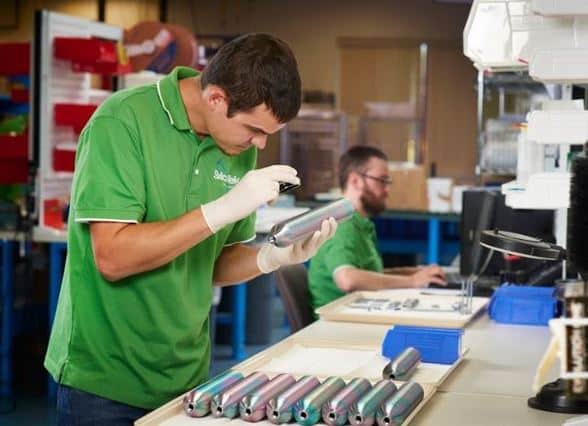“At the time I thought it was the worst day of my life”

Paul Silvis wants to have a word about failure. Silvis founded global chromatography authority Restek in 1985, and then went on to start the world’s leading high performance coating company SilcoTek in 2009, so failure may not be the first word that comes to mind, but he says that his best successes have all been born out of his worst moments.
“At the time I thought it was the worst day of my life, but looking back it was the best day,” he says. “Failure is an important part of success. Success will come. Entrepreneurs need to understand that. It’s all about mentality.”
Silvis sat down with me over Zoom to talk about the bankable value of failure, making solutions that customers can’t live without, and why he doesn’t want to be called a CEO. Read on.
HVI: What are the top things you feel the world needs to know about SilcoTek that it doesn’t already?
Silvis: SilcoTek was born out of one of those “Oh, shit” moments.
Restek was started in 1985, and in 1988 Hewlett Packard (now Agilent) decided to enforce a patent. It was one of those days when your life flashed before your eyes—Restek had just started, I’d mortgaged my house, and our sales were under $200,000. Hewlett Packard wanted $1 million for a license and there was no way we could pay it. Was this going to be the end of our business? We slowed down negotiations and immediately began working on a process to circumvent the patent.
The patent was on a high temperature polymer coated hollow core fiber called a fused silica capillary column, which offered unsurpassed inertness and ease of installation into a gas chromatograph. Instead, we decided to utilize thin wall stainless steel tubing and coat the inside by developing a CVD process (Chemical Vapor Deposition) with highly pyrophoric silane gas. It was the same size as the patented column with the same flexibility, ease of installation, and had similar inertness. We introduced these new MXT (metal extended temperature) columns and began growing sales. Five years after that initial call by HP’s corporate attorney, our sales were approaching $10 million annually and Restek was able to pay the $1 million licensing fee.
We grew the CVD process, called SilcoSteel, ultimately making more money by selling coated parts to Agilent (formally HP), then we ever paid for the licensing fee.
By the time Restek was sold to the employees as an ESOP in 2009, we decided to spin the technology off into an independent company called SilcoTek. We weren’t sure a larger market existed and had a lot of work to do to perfect processes and develop new coatings that essentially turn steel into teflon and make sensitive instrumentation rugged but as inert as glass. Since then, our coated parts have been as far away as Saturn, on coking towers for Exxon and in Samsung semiconductors.
HVI: What’s your secret sauce? What sets you apart from your competitors?
Silvis: We tell our customers not to use SilcoTek coatings unless the coatings impart improvements that they can’t live without. It’s a pain in the ass to take their products out of inventory, ship them to us to be coated, and then get them back. But once they make that leap, our CVD coatings eliminate problems with metal corrosion, provide anti-coking properties so exhaust carbon does not stick, render metal parts inert to any chemical adsorption, provide anti stick hydrophobic surfaces, and improve vacuum systems.
And, Plus One customer service dominates our culture. We look through the eyes of our customers and execute flawlessly. When we do make a mistake, we make it right. We provide game changing solutions. Right now, we are doing work for a company in the EU, coating sniffers for chamber chemicals. We kept running into problems with quality control. After running tests, we discovered that their machining had been done in different locations, and one had left contaminants on the surface. We spent four months cleaning their parts at no extra charge until they could fix their supply chain problems.
HVI: What are the pain points you’re uniquely solving for your customers?
Silvis: SilcoTek coats parts for the semiconductor industry, extending the life of chamber parts from six months to three years. These customers use corrosive gasses to etch channels into circuit boards on silicon wafers and these corrosive gasses eat apart the chambers and stainless steel flow paths. Our coatings prevent that from happening, allowing smaller chips with more power to be created, giving us more powerful phones and computers.
SilcoTek also coats parts for the medical industry rendering pathways inert from protein and chemical marker adsorption. For instance, a newborn child of a SilcoTek employee was diagnosed with a rare genetic disease. When they investigated, they discovered that the two infants tested prior had also tested positive. It was determined that there was contamination in the flow path from the prior child, and our employee’s baby wasn’t sick at all. Our coatings are now being used in that machine, eliminating false positives and false negatives.
From the perspective of founding your own company, what’s important to you about your company’s culture?
Creating a company where our employees enjoy coming to work just as much as coming home cannot be beaten. When a team enjoys working hard together, turns work into play.
We live our Core Values which we call FISHING:
- Fast Failure
- In-the-light
- Servant leadership
- Honesty
- Innovation in all we do
- Never stop learning
- “Give it all you got!”
SilcoTek has been a “Best company to work for in PA” for the past three years, and we believe that strong culture is built around the three elements: feeling safe and at home at your workplace, promoting leaders that demonstrate vulnerability and are not afraid to ask for help or fail, and creating a sense of purpose for changing the world. These principles are out of the book Culture Code by Daniel Coyle.
HVI: I noticed that your job title is “Head coach.” Can you tell me about that?
Silvis: When I started growing Restek, I was a geek, an inventor. I never took a financial class. I was clueless. It was a personal growth … a learning curve over time. I reached a point where we had 125 people and it was harder to manage. People left for other companies, and that was hard.
I decided that I couldn’t be the idea person any more. Instead, I had a vision to be the head coach. A head coach puts the right players in the right positions; provides training, tools, and opportunities for them to become star players; encourages an atmosphere of support and honesty; helps to define the team’s strategy for winning—all for the sake of creating a championship team which each member can be proud of!
That’s servant leadership. It’s not about me as a boss or our bottom line — it’s about how I can help my team do better in their jobs and in their lives. It all goes back to our culture code. A rising tide lifts all boats. That’s a mindset I learned because I didn’t know any better.
HVI: Why Happy Valley? What are the benefits of existing here in the Happy Valley ecosystem?
Silvis: The benefits are the people. This region’s high schools and trade schools, along with Penn State, have allowed us to have a dedicated, hard working and capable staff. Having access to this level of talent is the first and foremost key to SilcoTek successfully turning our visions into reality.
Partnering with the University has given us an unmatched capability to offer our customers extremely advanced analytical testing methods. The Materials Characterization Lab has equipment that would be well beyond the ability of SilcoTek to purchase at our current size. Having access to these extremely powerful instruments allows us to produce the data and information for our customers that speed up the sales cycle.
Cara Aungst writes about industry, innovation and how Happy Valley ideas change the world. She can be reached with story ideas and comments at Cara@AffinityConnection.com.






